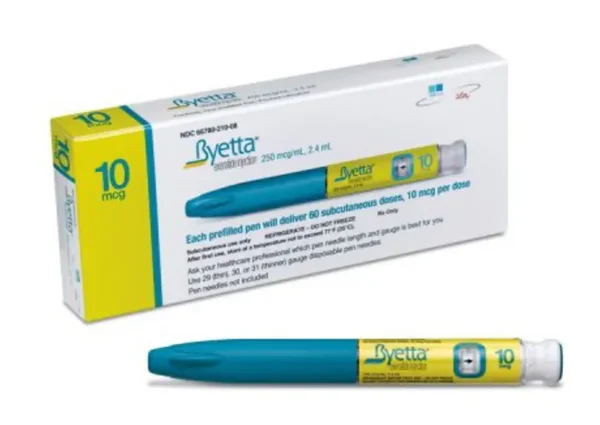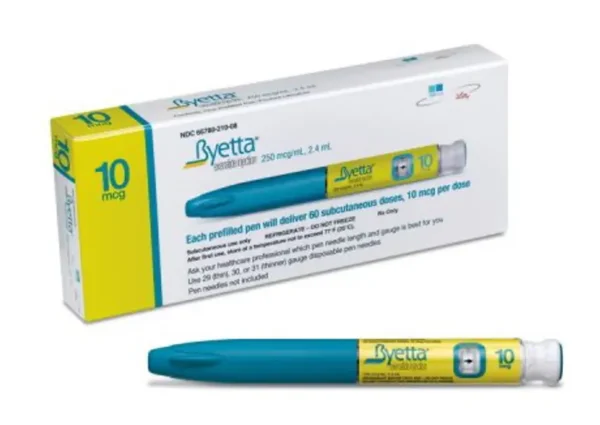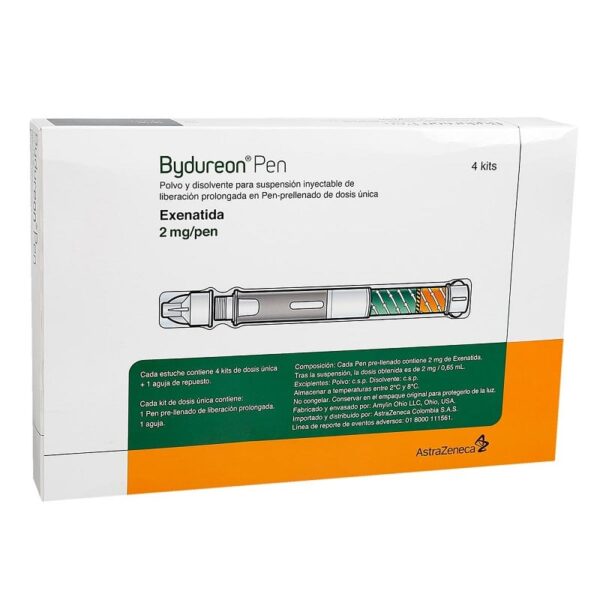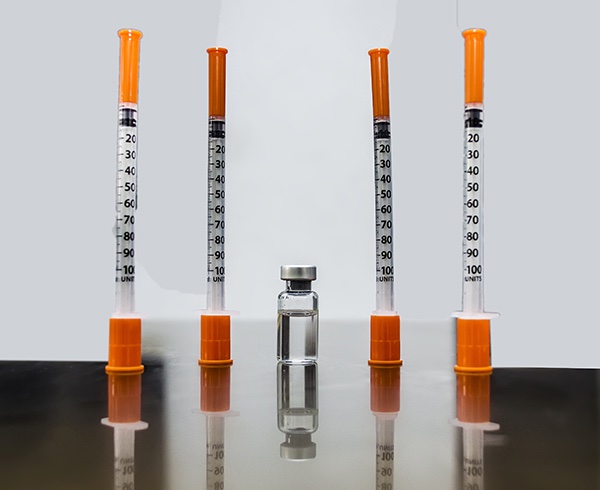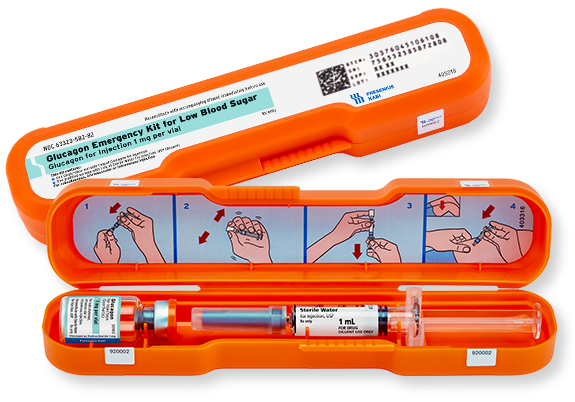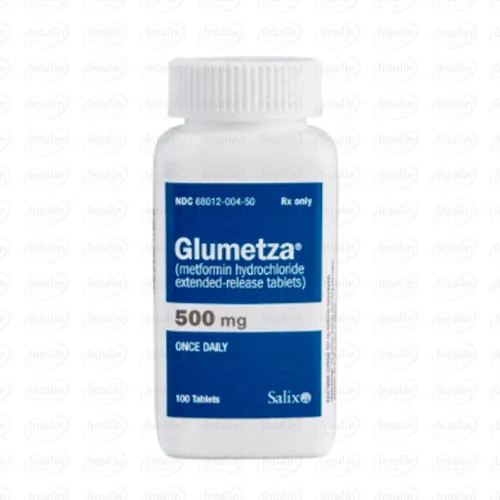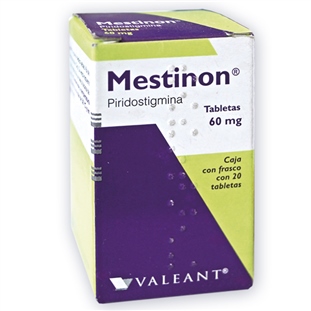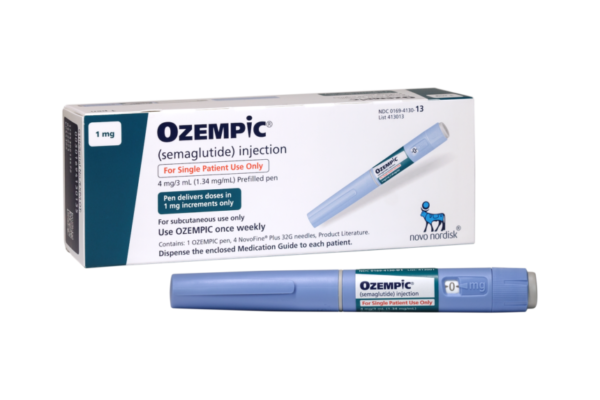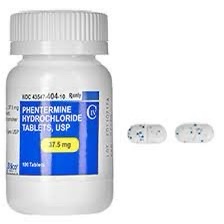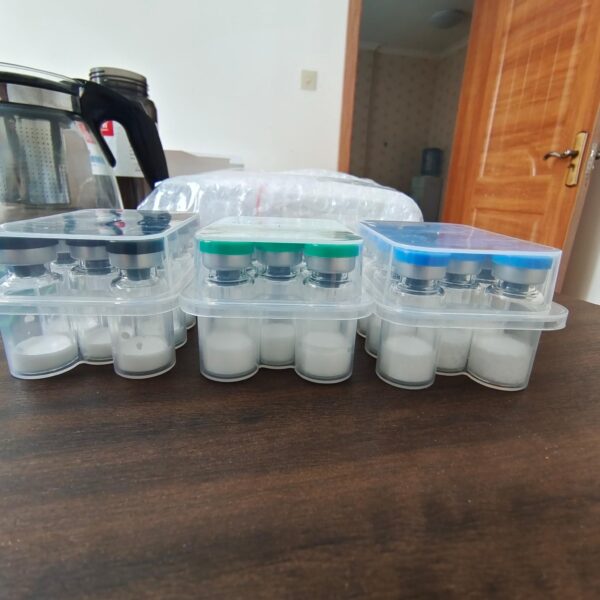Byetta (Exenatide) Injectable Pens Description
Byetta (exenatide) is used with a proper diet and exercise program to control high blood sugar. People with type 2 diabetes use it. Controlling high blood sugar helps prevent kidney damage, blindness, nerve problems, loss of limbs, and sexual function problems. Proper control of diabetes may also lessen your risk of a heart attack or stroke.
Exenatide is a diabetes drug that is similar to a natural hormone in your body (incretin). It works by increasing insulin release (especially after a meal) and decreasing the amount of sugar your liver makes. It also slows down food digestion in your stomach, reduces the amount of sugar absorbed from food, and may help decrease your appetite.
Studies have shown that GLP-1 reduces appetite and helps patients with weight loss (similar to Ozempic, Trulicity and Saxenda).
Diet and exercise are usually recommended as part of treatment to improve glycemic control.
Byetta is currently not approved or considered safe for children.
Warnings and Precautions
Before using exenatide, tell your doctor or pharmacist if you are allergic to it or have any other allergies. This product may contain inactive ingredients, which can cause allergic reactions or other problems. Talk to your pharmacist for more details.
Before using this medication, tell your doctor or pharmacist your medical history, especially of: stomach/intestinal disorders (such as gastroparesis, digestion problems), kidney disease, disease of the pancreas (pancreatitis), stones in your gallbladder (gallstones), a specific blood disorder from exenatide (drug-induced thrombocytopenia).
You may experience blurred vision, headache, dizziness, or drowsiness due to extremely low or high blood sugar. Do not drive, use machinery, or do any activity that requires alertness or clear vision until you can perform such activities safely.
Limit alcohol while taking this medication because it can increase your risk of developing low blood sugar.
It may be harder to control your blood sugar when your body is stressed (due to fever, infection, injury, or surgery). Consult your doctor because this may require a change in your treatment plan, medications, or blood sugar testing.
Before having surgery, tell your doctor or dentist about all the products you use (including prescription drugs, nonprescription drugs, and herbal products).
During pregnancy, this medication should be used only when needed. Pregnancy may cause or worsen diabetes. Discuss a plan with your doctor for managing your blood sugar while pregnant. Your doctor may change your diabetes treatment during pregnancy (including diet and medications, including insulin).
It is unknown if this medication passes into breast milk, but it is unlikely to harm a nursing infant. Consult your doctor before breastfeeding.
Consult your pharmacist or physician.
Usage
Before using Byetta, patients should read the Pen Manual and Medication Guide. Review medication preparation and usage instructions with your pharmacist. Consult your doctor or pharmacist if you have any questions regarding this medication or why you are taking it.
Inspect your medication for any discoloration or particles. If either is visible, do not use it.
Before injection, clean the area with a cotton swab and rubbing alcohol. Rotate the injection site to avoid any skin complications.
Byetta should be injected twice per day in the upper thigh, upper arm, or abdomen as instructed by your doctor, nurse, or diabetes practitioner.
It is recommended to administer medication 1 hour before meals (not after meals as it may not work as well), at least 6 hours apart, and before the two main meals of the day.
If you are also using insulin, separate your injections and do not mix them. Avoid injecting both medications into the same spot.
Please consult your doctor about any medications, over-the-counter drugs, or supplements you are taking so they can create a regimen for your prescriptions to avoid interactions.
Your dosage of Byetta is based on your existing medical condition and how your body responds to the treatment. Try to schedule your injections simultaneously every day and follow your doctor’s diabetes treatment plan, diet, and exercise recommendations if provided. Set reminders for injections in your smartphone to avoid missing doses.
Monitor your blood glucose levels regularly or as instructed by your doctor. Keep your doctor informed on your blood monitoring results. Your doctor may choose to adjust your treatment based on your blood sugar level results.
The typical starting dose for Byetta is five µg (micrograms), and the maximum amount is ten µg twice daily.
Side Effects
Nausea, vomiting, diarrhea, nervousness, or upset stomach may occur as your body adjusts to the medication. Nausea usually lessens as you continue to use exenatide. Other side effects include decreased appetite or weight loss. If any of these effects persist or worsen, tell your doctor or pharmacist promptly.
Remember that this medication has been prescribed because your doctor has judged that your benefit is greater than the risk of side effects. Many people using this medication do not have serious side effects.
Although exenatide by itself usually does not cause low blood sugar (hypoglycemia), low blood sugar may occur if this drug is prescribed with other diabetes medications. Talk with your doctor or pharmacist about whether the dose(s) of your other diabetes medication(s) needs to be lowered. Drinking large quantities of alcohol, not getting enough calories from food, or doing hefty exercise may also lead to low blood sugar. Symptoms may include sudden sweating, shaking, fast heartbeat, hunger, blurred vision, dizziness, headache, or tingling hands/feet. It is a good habit to carry glucose tablets or gel to treat low blood sugar. If you don’t have these reliable forms of glucose, rapidly raise your blood sugar by eating a quick source of sugar such as table sugar, honey, candy, or drinking a glass of fruit juice or non-diet soda. Check with your doctor or pharmacist to find out what you should do if you miss a meal.
Symptoms of high blood sugar (hyperglycemia) include thirst, increased urination, confusion, drowsiness, flushing, rapid breathing, and fruity breath odor. If these symptoms occur, tell your doctor right away. Your doctor may need to adjust your diabetes medication(s).
Tell your doctor right away if you have any severe side effects, including signs of kidney problems (such as a change in the amount of urine), yellowing of the eyes/skin, easy bruising/bleeding.
Exenatide has rarely caused a very serious (possibly fatal) disease of the pancreas(pancreatitis). Get medical help right away if you develop symptoms of pancreatitis, including nausea/vomiting that doesn’t stop, severe stomach/abdominal pain.
A severe allergic reaction to this drug is rare. However, get medical help right away if you notice any symptoms of a severe allergic reaction, including rash, itching/swelling (especially of the face/tongue/throat), severe dizziness, trouble breathing.
This is not a complete list of possible side effects. If you notice other effects not listed above, contact your doctor or pharmacist.

